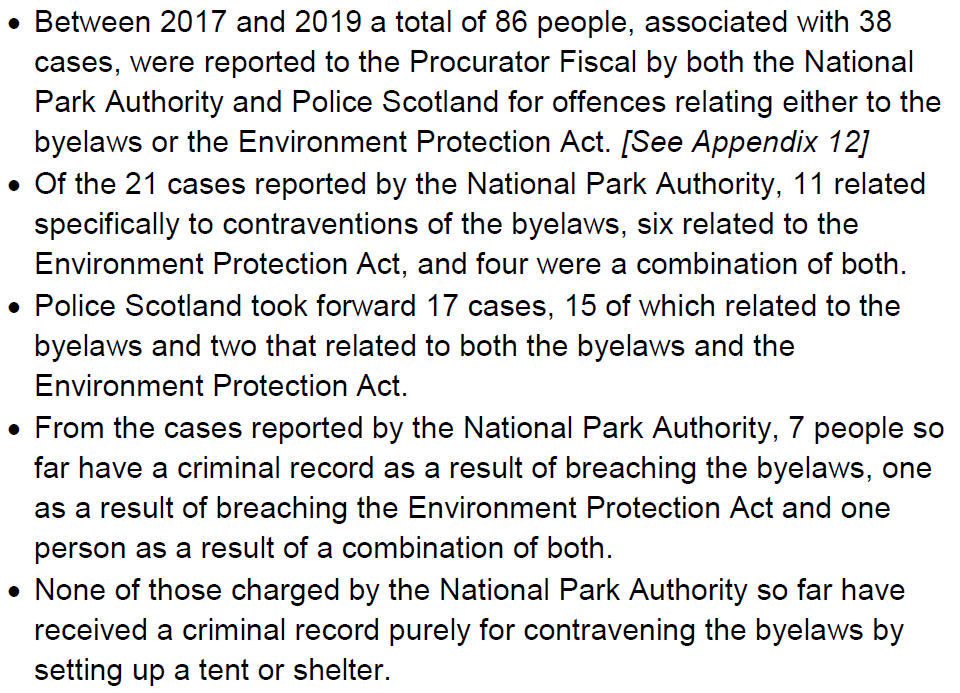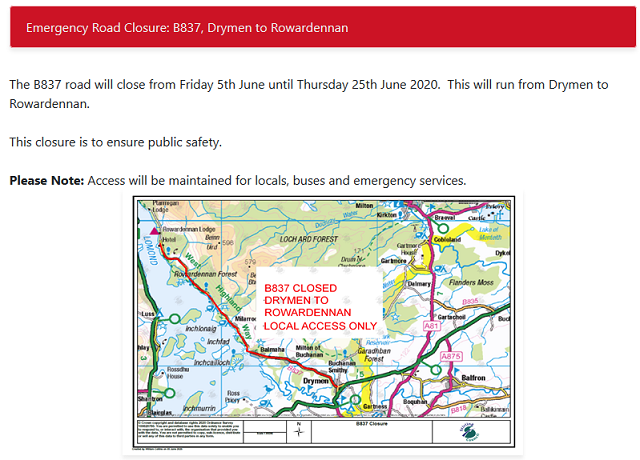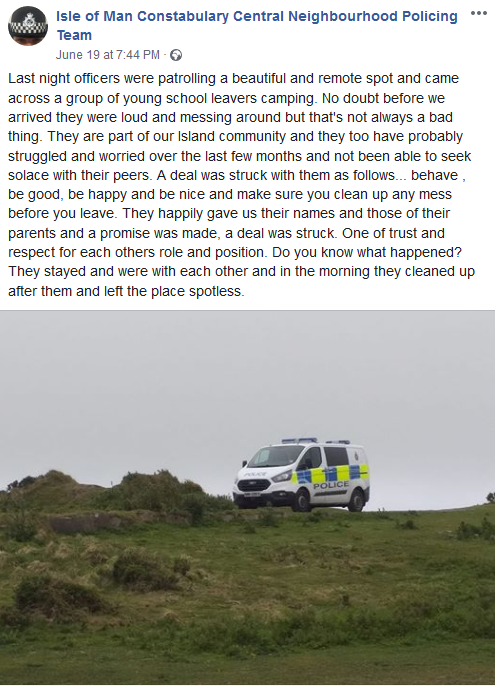
Two weekends ago Police Scotland charged the same number of people for breaching the camping byelaws in the Loch Lomond and Trossachs National Park than had been charged over the whole of the previous three years. Stirling Council’s response to people traveling into the National Park after the first phase of lifting of lockdown was announced was to use Temporary Traffic Regulation Orders to close the public roads to Rowardennan and to the Bracklinn Falls at Callander (see here). While the Scottish Government was gradually relaxing the Health Protection (Coronavirus) (Restrictions) (Scotland) Regulations 2020 (see here), giving people back their civil liberties, in the National Park legal restrictions were being increased.
Both measures are, in my view, an abuse of existing laws. They follow what appears to be the disproportionate policing of visitors to Balloch (see here) and the very serious charges levied against two hillwalkers who appeared to require the mountain rescue near Crianlarich (see here). This post takes a critical look at what has been happening.
Police use of the camping byelaws
On 12th June the Daily Record (see here) reported that:
“A total of 32 people were charged with a variety of byelaw offences relating to camping and setting fires within the National Park. Most were around Loch Earn, Loch Venachar and Loch Lubnaig.
That is the same figure the LLTNPA stated in their Report to Ministers had been charged under the camping byelaws in the previous three years:

The LLTNPA had reported 11 + 4 cases, Police Scotland 15 = 2 cases, total 32.
The LLTNPA has consistently said that the camping byelaws were only ever intended to be used as a last resort and re-confirmed that in their Report to Scottish Ministers three months ago (see here):
“The approach of the National Park Authority has always been proactive engagement and education first, with enforcement of byelaws where they exist, only used as a last resort when necessary.”
Whether you agree with them or not, the statistics show that up until now the camping byelaws had only been used as a last resort. Now, however, the police appear to be using them as a first resort. There is no other way of interpreting the statistics. A law intended for one purpose, to get campers to behave more responsibly, is now being used for another, to ban them completely. That is wrong, a mis-use of the law.
If camping was illegal under the Coronavirus Restriction Regulations Police Scotland could have issued a Fixed Penalty Notice of £60 (or £30 where paid promptly) and, where people failed to move on, could have kept re-issuing FPNs until they had reached the maximum fine of £960. Most people, faced with that, would have taken the £30 “hit” and left. Instead, the Police appear to have charged people under the camping byelaws, where the fine is £500.
That the police have used the camping byelaws strongly suggests that camping is no longer illegal under under the Coronavirus Restrictions Regulations. The explanation for this is that camping is a form of outdoor recreation and the Regulations now allow people to leave their home for outdoor recreation without time limit. That would also explain why there was no mention of campervanners being charged in the Daily Record story. If this is correct, it makes the police decision to charge 32 campers under the camping byelaws even worse, an abuse of their powers. Instead of asking people camped without a permit in the camping management zones to leave, as they have done for the last three years, the police have simply charged them.
The 32 people charged for camping in the National Park’s camping management zones appear to have been victimised and the police appear to have mis-used the camping byelaws to make a public example of one group of people. It would be public interest to know if the new National Park Police Officer, who took over from PC Barr at the end of last year and is paid for by the LLTNPA, was involved.
Stirling Council road closures

Predictably, the first weekend out of lockdown, many people decided to discount the Scottish Government’s advice not to travel more then 5 miles and escape the crowded parks and paths in the central belt towns for the countryside. They were welcomed by blocked off car parks, closed toilets and an absence of National Park Rangers. Unsurprisingly people parked where they could, on road verges etc. The response of our Public Authorities to their own failures, was to blame visitors:
“The relaxation coincided with the warmest weather yet this year and consequently the National Park experienced the full impact of an unprecedented set of circumstances stemming from mass non-compliance with the guidance not to travel more than 5 miles. Many places were inundated with large amounts of irresponsible and dangerous parking on road verges in hotspots like Arrochar, Luss, Balmaha, Falls of Falloch, Loch Lubnaig and parts of Callander. There were large gatherings of people in Balloch and Luss and huge amounts of litter left at sites such as Falls of Falloch. Despite the Duncan Mills Memorial Slipway remaining closed, there was significant powered craft activity on Loch Lomond, particularly jet-skis using alternative access points.”
(Extract from LLTNPA CEO Update to Board meeting Monday 14th June see here).
Words and phrases like “mass non-compliance”, “inundated”, “irresponsible”, “dangerous” and “huge amounts of litter”. Rather than admitting their mistakes and addressing the issues by opening car parks and toilets, re-starting litter collections etc, government agencies decided to make it even harder for people to visit by taking a number of new measures:
“This included road restrictions (local access only at East Loch Lomond, temporary speed restrictions and/or clearways at A82 Falls of Falloch/A84 Loch Lubnaig), extensive mobile variable signage, additional Police Scotland patrols, traffic enforcement officers, Ranger land and boat patrols, and an enormous amount of litter has been collected from heavily visited sites”.
While Transport Scotland imposition of speed restrictions on two trunk roads may have been an appropriate response to the great increase in roadside parking caused by the closure of public car parks, none of the other public agencies did anything to help. Instead, their focus was on bans and enforcement.
Stirling Council’s decision to use Temporary Traffic Regulation Orders to close the roads to Rowardennan and the Bracklinn Falls, provides another example of a public authority abusing their powers. On 28th April Transport Scotland issued advice on the use of TTROs during the Covid-19 crisis (see here):
“in response to requests from local authorities regarding ongoing physical distancing measures and the potential need to close roads to traffic or reallocate road space in favour of pedestrians and cyclists allowing for physical distancing measures.”
The idea was to use TTROs to help the public by creating temporary traffic free areas and favour pedestrians and cyclists. Instead, Stirling Council has used them to exclude the public. They have been able to do this because the legal basis for TTROs is that a danger exists to the public. Transport Scotland’s advice was that council could justify closing lanes on roads to enable the public to walk or cycle safely on the carriageway as well as on pavements – as people have been doing all over the southside of Glasgow. The only reason there was any danger to the public on the Rowardennan or Bracklinn Falls roads was that the public car parks at the road end had been closed. Instead of addressing the problem, Stirling Council closed the roads. That is another abuse of power.
The role of the Loch Lomond and Trossachs National Park Authority
At the LLTNPA meeting on Monday 15th June, which was broadcast live at the time (but is no longer available public), one of the Stirling Councillors, Graham Lambie, asked if the Park Authority couldn’t approach the Scottish Government to get their 5 mile advisory travel limit enshrined in law. No-one argued against this or questioned why Public Authorities in the National Park were using their legal powers to enforce what was only government guidance. Nor did any Board Member pick up on the excellent point made by Ronnie Erskine later in the discussion about the amount of physical and mental health problems that have been caused by the restrictions.
Instead, the Board Papers confirm that the LLTNPA appear to have been the driving force behind all these restrictions, chairing the “National Park Safe Recovery Action Group” which agreed them:

The LLTNPA appears set to continue in the same vein:
“The group will continue to meet to co-ordinate resources, enforcement and traffic management actions as well as future phases of reopening”.
This is from an organisation that has a statutory duty to promote public enjoyment of the countryside. Evidence for how the police and local authorities have acted elsewhere suggests it may have been the LLTNPA that has been responsible for pushing the police and Stirling Council to abuse their powers.
Outwith the National Park, Police Scotland appears to have policed the corona crisis appropriately despite the recent controversy over policing of protests. They have been clear that they can enforce the law, including activities that were made illegal under the Coronavirus Restriction Regulations, but not government guidance. They have set up an inquiry, under John Scottish QC, to look at whether they have respected human rights. The Black Lives Matter demonstrations and the counter protests have put the police in a very difficult position because, under the Restrictions Regulations, any gathering over eight people, is a criminal offence whether or not people observe physical distancing. To protest is an offence, to travel to the countryside for outdoor recreation is not.. The Scottish Police Federation chair, David Hamilton, put his finger on the political guddle when he said on Friday: “there was more condemnation of people going to Loch Lomond than there was of people attending any of the mass protests”. Mass protests generally pose far more risks of spreading Covid-19 than visits to the countryside.
This re-inforces the point that the police response in the Loch Lomond and Trossachs National Park has been disproportionate and out of kilter to their approach in the rest of Scotland: the high level of fines at Balloch, the charges against hillwalkers (and there were another two near the Cobbler) and now 32 campers charged under the camping byelaws. A possible explanation for this comes from the Daily Record story:
“Police have been quick to warn people heading to local beauty spots this weekend that officers will out and about and that it remains illegal to set up camp or start a fire in the National Park while it is closed”.
The National Park isn’t closed, no-one has the power to do that, although the LLTNPA was doing its best to suggest the opposite:
![]()
There are similar questions about the proportionality of Stirling Council’s response compared to other Local Authorities. Perth and Kinross Council, for example, appear not to have closed off any of their car parks during the crisis. Fife Council was quick to re-open their car parks as soon as lockdown was relaxed. By contrast Stirling and Argyll and Bute, the two main councils in the Lomond and Trossachs National Park have continued to follow slavishly the government’s advice on car parks. Sadly, it appears access in the LLTNPA is being managed worse than anywhere in Scotland.
That there is another way has been nicely illustrated by the Police on the Isle of Man:

When with the LLTNPA, and the agencies it works with, stop treating people as a problem and instead start to facilitate their enjoyment of the countryside and the huge amounts of space in the National Park?

Most local decision-making emerges from the culture set at the top.
In Scotland we have an SNP govt. which is trying very hard to maintain it’s sole political aim of gaining independence: a real alternative to the dangerous incompetence that is currently wallowing in Westminster like beached Hippo in the arctic – out of place, unable to understand the gravity of their position and due for extinction.
However, given the opportunity to provide real strategic leadership and not just patronising, pseudo emotive language declaiming how much they care and that people are not forgotten, the culture from the top in Scotland is becoming increasingly unable to provide genuine leadership other than to hide behind a plan which has little real substance and has required extensive detailing to help people make sense of it.
So to with the LL&TNP who clearly have taken their stance from the style of leadership demonstrated at the top; now backed by a Police service who simply have to enact the laws they are presented with.
Thankfully, many outdoor recreationists on land and water are making sensible judgements and getting out there well outside the insensitive, unnecessarily over-protective guidelines which continue to ‘’hide’ (Leitch’s word not mine) communities from reality…and I look forward to my next sea kayak trip which will start beyond 7 miles from home and take me even further with a group of very experienced paddlers.
I think these observations are entirely accurate in that a culture often ends up reflecting its leadership, because that way approval, implicit or explicit, lies; Carl Jung knew it, and Freud before him. In an earlier post I mentioned that my neighbour used to work for Ms. S in the SG’s Dept. of Health, and referred to her as a “power-mad control freak”, which is exactly the term suggested by Nick’s description of the abuse of legislation described above by the police. It seems that my neighbour’s view is becoming increasingly appreciated, and that in the early days Ms. S was seen as strong and assertive, but when circumstances change and there is no inherent ability or desire in what’s known in organisational contexts as “the controlling mind”, i.e. where the buck finally stops, or there exists no maturity or intellect to change, then we end up losing trust and suspecting ulterior motives, leading thence to (often malicious) rumour. That’s not to say however that just because we’re paranoid, the SNP aren’t out to get us, but it would be good to experience something by way of common sense, which isn’t something oft associated with the Isle of Man, it must be said. I think Ms. S and the SG are beginning to expend their political capital in pretty big wads, so carefully saved in earlier times, especially as pubs, theatres, cafes, car parks, toilets etc., south of the border are opening wholesale. Johnson 1 – 0 Sturgeon in this round, as I’m sure would have been reported in The Angry Corrie.
“Nicola, ffs, I just want to go for a walk!”
The not your park llatnpa frequently asked questions section clearly show the obnoxious bias angling (stay 5 miles within)camping no, boating (stay within 5) wild swimming you should not go travelling long distances to go swimming they clearly have a problem with certain people in our society is that not what people are rioting about in our city’s?
I’m afraid that any party that includes ‘National’ in its title seem to exhibit strong authoritarian tendencies.
And the SNP fills that bill completely
Citizens are expected to be compliant to rules or else.
Fortunately the Covid -19 period has shown the SNP in its true colours .
Old folk in hospital decanted to Care Homes untested for virus and without their permission.
Walkers and climbers threatened and fined for keeping themselves healthy in mind and body.
No point in asking the police why?
Its a rule and must be obeyed.
Regulations similar to a wartime emergency have been passed and for an authoritarian mindset too tempting not to be used.
Will these new laws be removed once the covid -19 period ends
I don’t think so!
Old folk moved out of hospital and back to THEIR HOMES you mean. I’m sure you have the same hatred of the NATIONAL library, NATIONAL healthe service, Scottish NATIONAL orchestra, NATIONAL trust for Scotland, NATIONAL blood transfusion service among others.
Councillor Graham Lambie needs to be removed from office, what he said is a dangerous to democracy. The LLTNPA should be disbanded now,even at this moment the LLTNPA is stil keeping out boaters from launching their boats. Is this leagal. Nicola Sturgon last week demanding more money from the UK Government for lockdown in Scotland, England is trying to get their economies up and running rightly or wrongly. Here In Scotland wee are largely under populated with vast areas of land but Nicola Sturgon is destroying the highlands economy and Scottish turisom. Scottish turisom is in a beter place than England during the pandemic because we are under populated with more space which should have being taken into acount, instead its being destroyed because the First Minister is playing politics with our life’s but asking England to send money. Now the Councillor Graham Lambie wanted to break up our country into private areas Scotland is still in the middle ages
Scotland is in no way underpopulated. We are overpopulated, just not as badly as england. Any sensible government would be trying to reduce the population, but every single party supports mass immigration and the destruction of Scotland, Scottish culture and Scottish people. Not necessarily in that order.